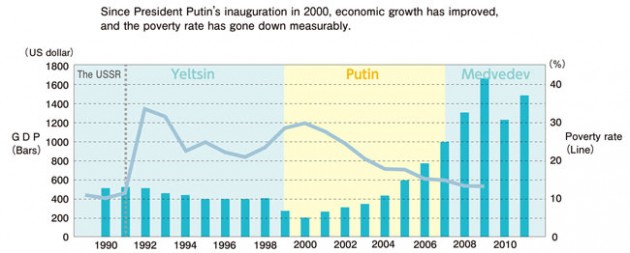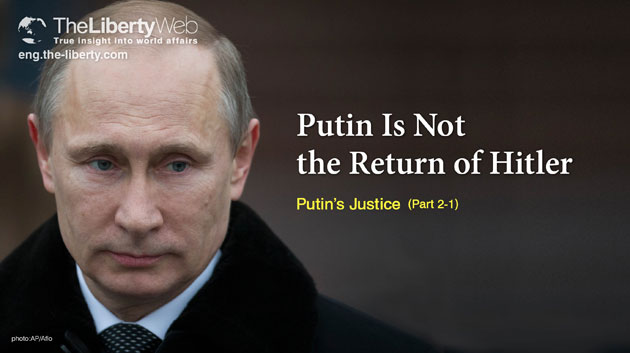Putin Is Not the Return of Hitler (Part 2-1)
Due to his hard-line position on the annexation of Crimea, and his autocratic style of governance, Mr. Putin has been criticized for attempting to revive socialism. In Part 2, The Liberty will take a look at Mr. Putin’s actions, focusing on Russia’s domestic front.
Russian actions to annexe Crimea without Ukrainian consent have been widely
denounced in the West as being against “International Law”. German Finance Minister Wolfgang Schauble criticized the Russian actions. He said, “Hitler adopted similar methods in the Sudentenland.”
Mr. Putin has been painted with the image of a “dictator” because he has sought to destroy international order and democracy. Furthermore, Mr. Putin has shown autocratic tendencies in his domestic politics. He has directly appointed local chiefs without elections and has fired owners of TV stations for criticizing his government.
Some of his activities have probably been related to his previous work as a Soviet KGB agent.
Ukraine’s Interim Government Is Illegal
Crimea, as well as domestic issues within Russia, need to be analyzed from multiple perspectives.
For instance, the pro-Western interim government of the Ukraine criticizes Russia’s annexation of Crimea as violating the Constitution. However, the interim government itself has not been democratically elected in accordance with the Ukrainian Constitution. Strictly speaking, it has been classified as an “illegal regime” because it forced out the democratically-elected President Yanukovych.
Furthermore, the Ukraine Parliament, set up by an interim
government in March, excluded Russian from being recognized as one of its quasi-official languages despite the fact that 20% of the population was Russian. This decision resulted in massive protests by the ethnic Russian minority to the point where one of the eastern provinces of the Ukraine, Donetsk, began to seek independence. The exclusion was later withdrawn, but Russian critic Yavlinsky stated that anti-Russian (pro-West) nationalist policy became extreme. (China News Service, electronic edition)
Russia Continued to “Collapse” After the Collapse of the Soviet Union
President Putin’s approval rating in Russia is over 80%. To understand this high approval rating, it is necessary to understand the path that Russia had taken since the fall of the Soviet Union.
Russia during the 1990s experienced rapid economic deregulation and a decline in its standard of living. The state-owned businesses such as the oil industry were privatized, but it was controlled by a small group of “Oligarchs”. The tax system hadn’t been implemented well, which resulted in the Oligarchs monopolizing the wealth.
The Oligarchs had enough power to use the media to get President Yeltsin re-elected. For the citizens, they had merely gone from a Communist dictatorship to an Oligarch dictatorship.
The central government’s power had degraded to the point where some states within the Russian Federation were passing laws that clearly contradicted the Russian constitution, and Russian polity had become shattered. International relations analyst Yoshinori Kitano reflected on the situation at that time, “Toward the end of the 90s, the Russians didn’t like democracy much.”
President Putin Revived the Russian Economy
It was during this time of crisis that Mr. Putin was elected to be President in 2000.
While pushing through tax reforms, Mr. Putin accused the Oligarchy of tax evasion, and successfully destroyed their “dictatorship”. Consequently, wealth began to reach ordinary citizens. Russia’s important oil sector was able to increase the nation’s access to foreign currency due to increases in oil prices, and Russia’s economy rapidly recovered. The percentage of those below the poverty line decreased from 30% in 2000 to 15% in 2007.
In his domestic governance, Mr. Putin introduced a system where he would appoint hand-picked representatives to oversee local governments. This allowed a consistent set of public policies to be enacted, and laws came to be upheld once again.

What About the Freedoms of Speech and Religion?
The freedoms of speech and religion are huge factors that separate democracy from authoritarianism.
The atheist Soviet Union suppressed religion, but Putin took initiatives to support the Russian Orthodox Church and has recognized the freedom of religion. Perhaps for this reason, in the last 15 years the numbers of atheists have decreased to half, and regular church goers have increased four-fold.
However, observation of the freedom of speech has been a problem.
For instance, a journalist, who was critical of the government, died from mysterious circumstances, and blogs with over 3,000 daily viewers have been obligated to report to the government.
However, for the Russians that experienced the collapse of their country due to Glasnost (information disclosure) it was somewhat inevitable for them to feel compelled to balance freedom and order.
While it is easy for us to criticize him as a “dictator”, it may be harsh to demand the same level of freedom and democracy from a nation that experienced the collapse of the Soviet Union only 20 years ago. If one were to compare Russia today to post-war Japan, it’d be where Japan was in 1965, in the midst of “rebuilding the country”.
A Commonly Held Understanding:
Putin is a dictator who opposes democracy.
The Result of Part 2-1:
Putin has been rebuilding a nation that fell apart after the fall of the Soviet Union.



















